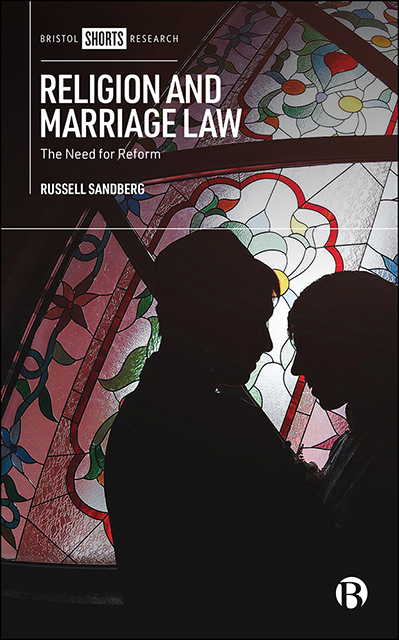Five - Non-Religious Marriages
Published online by Cambridge University Press: 18 April 2023
Summary
Introduction
This chapter explores the other main concern that has arisen in recent years: the exclusion of non-religious belief marriages under the Marriage Act 1949. This chapter will fall into three sections. The first will introduce the issue, while the second will examine how this issue has arisen in the public debate, exploring the campaign of Humanists UK during the parliamentary passage of the Marriage (Same Sex Couples) Act 2013 and subsequent legal and political developments. The final section will then discuss the High Court challenge of the current law in R (On Application of Harrison) v Secretary of State for Justice, which concluded that the law interfered with the applicant's human rights but that this was justified by the fact that the law was currently under review by the Law Commission.
The context
English law has struggled with the recognition of non-religious beliefs. This is reflected in a series of unprincipled and contradictory Employment Tribunal decisions on how belief is to be defined for the purpose of employment law. Beliefs in independence for Scotland and veganism have been protected, while the wearing of a poppy and vegetarianism have not, for instance. In relation to marriage law, the problem is rather different: non-religious belief systems are simply excluded. Section 41(1) of the Marriage Act 1949 provides that a ‘proprietor or trustee of a building, which has been certified as required by law as a place of religious worship may apply for the building to be registered for the solemnization of marriages therein’. The provision of protection only on grounds of religion is socially, politically and legally outmoded.
A report by an All Party Parliamentary Humanist Group in 2018 suggested that until the 1970s a blind eye had been turned to the issue and weddings conducted by belief groups were considered to be legally binding. According to the report, ‘some ethical societies performed wedding ceremonies in their venues, and relatively lax interpretations of the law at the time meant that these generally had legal recognition’. The report noted that ‘this continued until the anomalous position was picked up by Government officials in the 1970s’. The Court of Appeal decision in R v Registrar General, ex parte Segerdal then provided the common law definition of place of religious worship (to refuse an application by the Church of Scientology).
- Type
- Chapter
- Information
- Religion and Marriage LawThe Need for Reform, pp. 49 - 64Publisher: Bristol University PressPrint publication year: 2021



